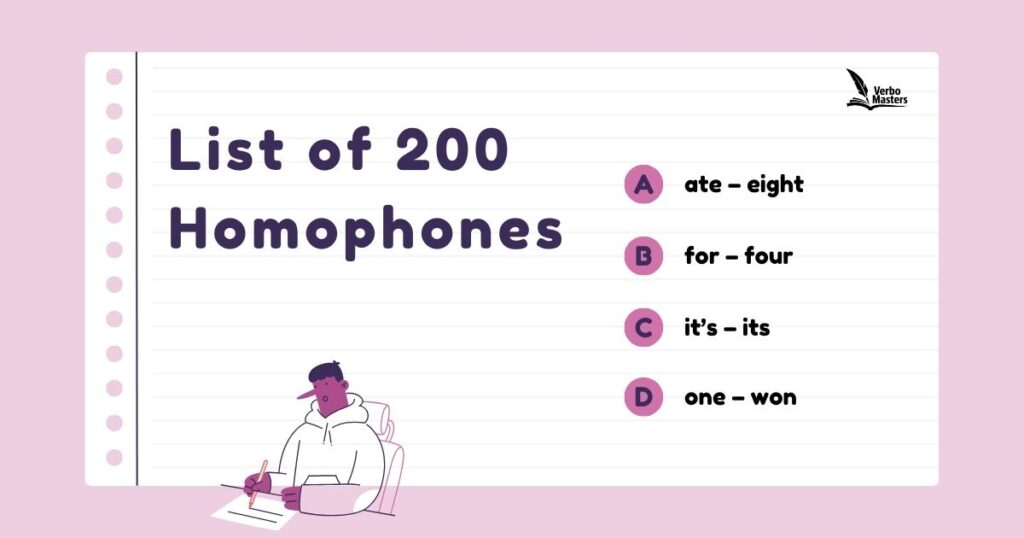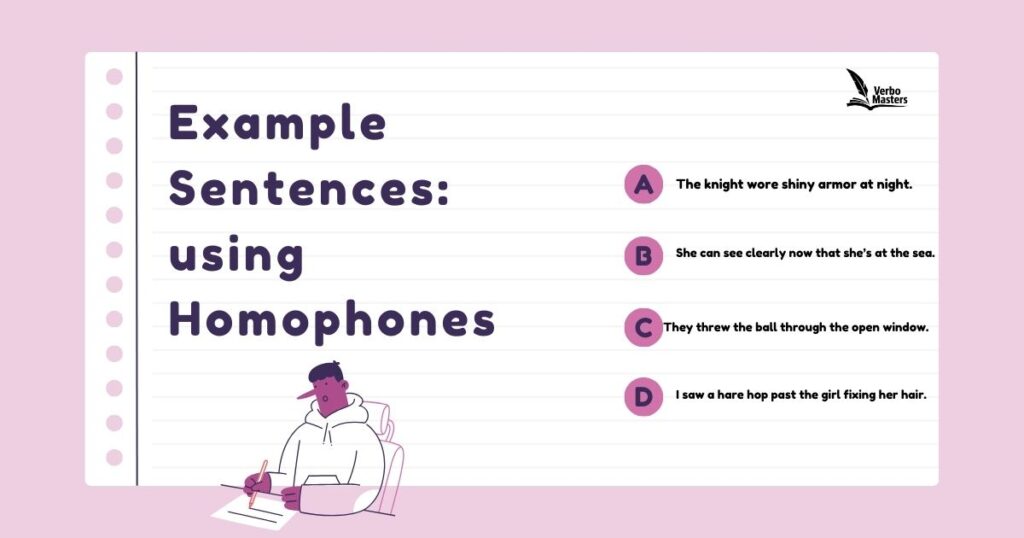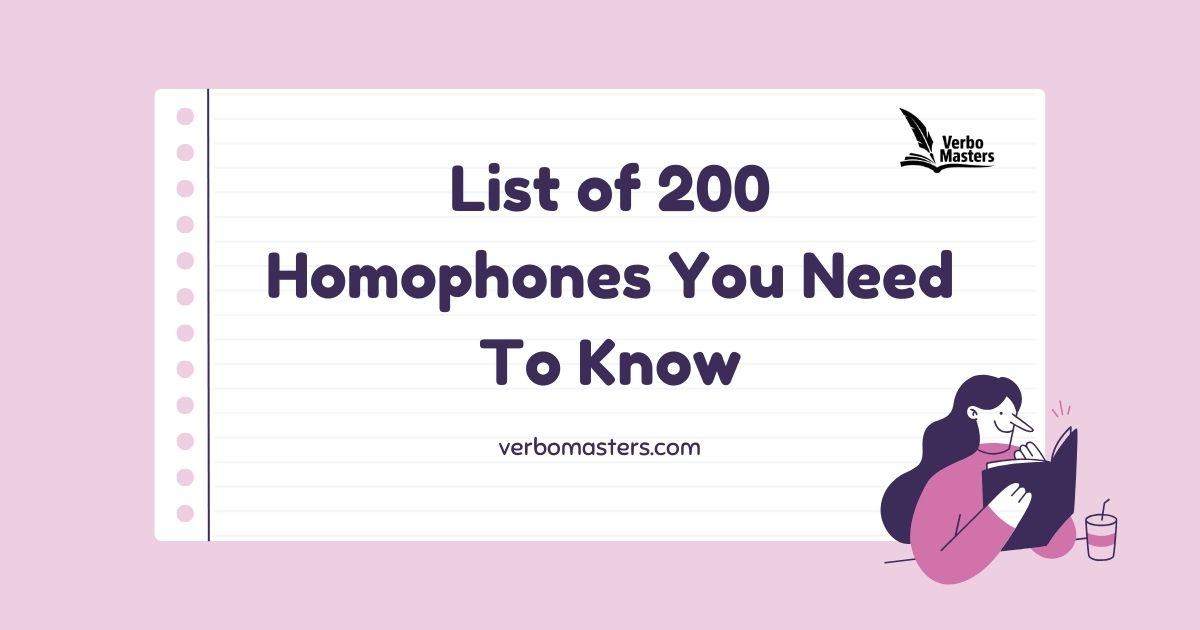Homophones are words that sound the same but have different meanings and spellings. They can be tricky, but they’re fun to learn! Knowing them helps you write and speak more clearly. You’ve probably used some without even realizing it. Words like “two,” “to,” and “too” are great examples. This list will help you master 200 common homophones with ease.
You can also read; 200 Examples of interjection in sentence
✅ List of 200 Homophones

- accept – except
- affect – effect
- aloud – allowed
- ate – eight
- bare – bear
- be – bee
- brake – break
- buy – by
- cell – sell
- cent – scent
- cereal – serial
- coarse – course
- complement – compliment
- dear – deer
- die – dye
- fair – fare
- flour – flower
- for – four
- hair – hare
- heal – heel
- hear – here
- him – hymn
- hole – whole
- hour – our
- idle – idol
- it’s – its
- knight – night
- lead – led
- leak – leek
- lessen – lesson
- made – maid
- mail – male
- meat – meet
- miner – minor
- morning – mourning
- none – nun
- oar – ore
- one – won
- pair – pear
- peace – piece
- plain – plane
- praise – prays
- principal – principle
- rain – reign
- right – write
- road – rode
- root – route
- sail – sale
- scene – seen
- sea – see
- sew – so
- sight – site
- sole – soul
- son – sun
- some – sum
- stare – stair
- stationary – stationery
- steal – steel
- tail – tale
- their – there
- threw – through
- to – too
- vane – vain
- wait – weight
- waist – waste
- weak – week
- wear – where
- whether – weather
- witch – which
- wood – would
- aloud – allowed
- bail – bale
- band – banned
- base – bass
- be – bee
- billed – build
- blew – blue
- boar – bore
- board – bored
- bow – bough
- bread – bred
- brewed – brood
- buy – bye
- cache – cash
- capital – capitol
- cast – caste
- cede – seed
- ceiling – sealing
- cell – sell
- chased – chaste
- cheep – cheap
- cite – site
- clawed – Claude
- colonel – kernel
- cops – copse
- currant – current
- cue – queue
- deer – dear
- descent – dissent
- die – dye
- draft – draught
- dual – duel
- earn – urn
- ewe – you
- faint – feint
- faze – phase
- find – fined
- fir – fur
- flea – flee
- flour – flower
- gait – gate
- gene – jean
- gorilla – guerrilla
- guessed – guest
- hail – hale
- hanger – hangar
- hay – hey
- hi – high
- him – hymn
- hoard – horde
- holey – holy
- idle – idol
- incite – insight
- jam – jamb
- key – quay
- knot – not
- know – no
- lead – led
- leek – leak
- lessen – lesson
- loot – lute
- made – maid
- mail – male
- main – mane
- meat – meet
- medal – meddle
- miner – minor
- missed – mist
- moan – mown
- morning – mourning
- muscle – mussel
- naval – navel
- none – nun
- oar – or
- one – won
- pair – pare
- palate – palette
- passed – past
- peak – peek
- pedal – peddle
- phase – faze
- plain – plane
- pole – poll
- praise – prays
- principal – principle
- prophet – profit
- real – reel
- rain – rein
- rap – wrap
- read – red
- right – rite
- ring – wring
- road – rode
- role – roll
- root – route
- rose – rows
- sail – sale
- scene – seen
- seam – seem
- sew – so
- sight – cite
- sole – soul
- some – sum
- son – sun
- stair – stare
- stationary – stationery
- steal – steel
- stile – style
- suite – sweet
- tail – tale
- tea – tee
- team – teem
- their – there
- throne – thrown
- tide – tied
- toe – tow
- toad – towed
- vane – vein
- waist – waste
- wait – weight
- war – wore
- weak – week
- weather – whether
- wear – where
- which – witch
- whine – wine
- wood – would
- yoke – yolk
- your – you’re
- yaw – yore
Example Sentences: using Homophones

- I want to buy a new phone, by the end of the week.
- She knew the answer even though it was new to her.
- The sun was shining while the son played outside.
- Please pair the socks before putting them in the drawer, said the pear-loving grandma.
- I couldn’t bear the noise, so I left the bare room.
- He hurt his heel while trying to heal from a sprain.
- The knight wore shiny armor at night.
- I didn’t know where to go, so I said no to the trip.
- He wrote a letter to the editor and climbed the ladder afterward.
- She can see clearly now that she’s at the sea.
- The teacher asked us to read the book and mark the words in red.
- The flour is in the pantry, next to the flower vase.
- I watched the wind blew the leaves past the blue car.
- They will wear new shoes to the event where it’s formal.
- Two kids ran by, but I only saw one of them go to the store too.
- The puppy wagged its tail while I read it a tale.
- We had a picnic on the plain and watched a plane fly overhead.
- Please cite your source when you visit the construction site.
- The brake on my car is broken, and I need a break!
- She tied the gift with a red bow, and placed it under a tree’s bough.
- The sale ends today, so set your sail and hurry to the store!
- I lost my peace of mind when a piece of the puzzle went missing.
- They threw the ball through the open window.
- He found the secret route that led to the tree’s root.
- I couldn’t hear the movie because someone wouldn’t stop talking here.
- She’s in the school choir, even though she’s a bit quieter than the rest.
- The angry coach made him run laps, and he didn’t find it a good pun.
- Her favorite artist painted a stunning scene, which she had already seen.
- The carpenter hammered the nail and told a funny tale.
- Don’t forget to mail the male cat’s adoption papers.
- I couldn’t bare the pain after stepping on the bear toy.
- Her shoes were made of leather, but didn’t let her walk in rain.
- He used a fishing pole, then responded to the online poll.
- The dog wagged its tail while we read a bedtime tale.
- The ship stayed near the shore so people wouldn’t snore during the ride.
- The gardener used a hoe but didn’t want to hurt the garden hoes.
- He wanted to knead the dough until it was soft need.
- She got a perfect score on her test, but it didn’t feel like a jest.
- The old man had a strong soul, walking on his own sole.
- We picked the apples with great care, even though we were bare-handed.
- I can’t reign over a kingdom if my crown won’t stay on in the rain.
- She rode her bike down the road while he rode the scooter.
- The team is ready to meet at noon and eat some meat.
- The bell rang just as the wrestler stepped into the ring.
- He wanted to right the wrong, so he began to write an apology.
- I saw a hare hop past the girl fixing her hair.
- The kitten scratched the board while the student felt totally bored.
- The cold wind made her blew out the candle and feel a bit blue.
- Don’t forget your role in the play or you’ll roll off stage!
- We’ll wait for you, so don’t carry all that weight alone.
FAQs
What are homophones?
Homophones are words that sound the same but have different meanings and spellings. For example, “flour” and “flower.”
Why are homophones important in English?
They help make language fun and interesting, especially in jokes, poems, and wordplay. They also teach us to be careful with spelling.
Can homophones confuse readers?
Yes, if used incorrectly, they can be confusing. That’s why it’s important to learn the right spelling and meaning for each one.
Are homophones and homonyms the same?
Not exactly. Homonyms sound the same and may also be spelled the same, while homophones only sound the same but are spelled differently.
How can I remember the difference between homophones?
The best way is through practice, like reading, writing, and using them in sentences. Flashcards and examples also help.
Do all languages have homophones?
Many languages have them, but not all to the same extent as English. English just happens to have a lot due to its mixed origins.
Are homophones used in puns?
Yes, homophones are perfect for puns because they sound alike. They help make jokes more fun and clever.
What are some common homophone pairs?
Some common ones are: to/too/two, your/you’re, hear/here, their/there/they’re, and right/write.
Can homophones be more than two words?
Yes, some homophones come in sets of three or more, like to, too, and two. They all sound the same but mean different things.
How can I teach homophones to kids?
Use fun examples, pictures, rhymes, and games. Kids learn best when lessons are playful and easy to relate to.
Conclusion
Homophones are a fun and important part of learning English. They sound the same but can mean very different things. Knowing how to use them helps with spelling and writing clearly.
By practicing homophones in sentences, it gets easier to tell them apart. You start to notice how context changes meaning. This helps improve both reading and communication skills.

I’m John Smith, a language enthusiast dedicated to helping writers, students, and professionals master the art of clear and effective communication. Whether you’re looking for grammar tips, writing guides, or common mistake corrections, you’ll find valuable insights to improve your language skills. Let’s make grammar simple and fun!

